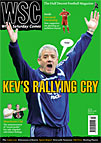 Al Needham has met a fair few footballers in Nottingham but the experience has been far from rewarding
Al Needham has met a fair few footballers in Nottingham but the experience has been far from rewarding
Whenever a friend of mine gets into a pub argument about Manchester United (which is often), he relates the following story: when he worked in one of Nottingham’s trendier clothes shops in the early Nineties, the only place that had Timberland boots in stock, Roy Keane came in. After a nod from his manager, my friend mentioned the obligatory 25 per cent discount. “And he didn’t say thank you or anything, he just walked out the shop with the boots under his arm,” my friend says, his face screwed up in a righteous sneer, as he prepares to unleash the killer line. “And he had his fucking jumper tucked into his jeans, the… the twat.”
Every time I hear about another player getting into trouble in public, I think about that story, as it demonstrates the general disappointment the public feels whenever our sporting heroes make the mistake of daring to mix with the rest of us. For starters, everyone remarks – often to your face – on how shorter you are in real life. Then, as much data on your appearance and demeanour at that particular moment will be processed, analysed and spat out across the internet, in pubs, and at grounds, for ever.
It never used to be like this. Once upon a time, footballers were mere mortals – people you’d love to be mates with, of course, but mere mortals all the same. I remember being 11, and seeing Viv Anderson and Bryn Gunn in town, wearing matching knitwear, like a multiracial Kel and Kath out of Kath & Kim. “Ayup Viv! Ayup Bryn!” I squeaked. “Ayup, mate!” they said, before nipping into a pub. I floated home and told all my mates, who were universally unimpressed. They saw Forest internationals knocking about town all the time, and one even claimed that Viv had asked his dad for some change for the one-armed bandit at the Beer Keller, a German theme pub all the footballers and Radio Trent DJs frequented.
Before becoming another Man Utd flop, Peter Davenport would regularly be seen coming out of the city library and taking the bus home, and nobody would bat an eyelid. Brian Clough himself would regularly walk his dog by the Trent at 5am, greeting every angler with a cheery “Morning, lads!”, and then he’d run his son’s paper shop in the afternoon (he once sold a mate of a mate a copy of Melody Maker).
Obviously, this doesn’t seem to happen any more, and there’s quite a few reasons why. The colossal hike in salaries didn’t help, making sightings a lot rarer. The upshot of this is that every player sighting is recounted in breathless detail, with the teller of the story adding so much weight and embellishment to the event that you half-expect it to appear as an entire chapter in the player’s autobiography. For example, when I was at university and working part-time at the Tote, I took a £50 bet on a horse from Paul Merson. In reality, I didn’t even bother looking up to take his money, and had to be told by the manager who it was after he left. Nowadays, when I recount the story, I’m one of the people goading his inner demons and helping him down the slippery slope to Addiction Hell, and I’m still waiting for an invite to a tearful reunion, preferably on national television, with a tie-in book deal. Another friend swears blind that he knew about Stan Collymore’s depression long before anyone else, on account of the vast amount of speed garage records Stan was buying at his shop.
Obviously, speaking for my home town, it doesn’t help that the footballers who play here aren’t of the highest standard any more. To describe a club or bar as “the place where the footballers go” is almost on a par with “that’s where that dealer got shot”. Furthermore, punters have changed as much as players have: there are almost as many migrant workers from other towns, students, and glory-hunting big-club supporters as locals these days. A Spurs-supporting friend working behind a bar “congratulated” Des Walker for his own goal in the 1991 FA Cup final a while back, and it says a lot for the man that my mate is not still picking chunks of Hoegaarden glass out of his face today. And I don’t think Jermaine Jenas has shown his face in Nottingham since the time he entered a club wearing a T-shirt with his name and number on the back and got laughed out the building.
Putting it all together, it’s no wonder that professional footballers all live in a massive bubble on the same estates in the same massive houses – it’s scary out there. Trumped-up roasting and drug allegations are one thing, but being spotted in a pub in town absent-mindedly opening a packet of crisps with your teeth or wearing the wrong jumper can cause far more long-term damage.
From WSC 253 March 2008